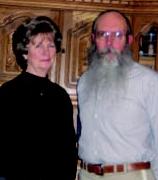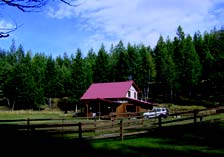Finding Mount Sinai in Montana
As Shavuot approaches, a yom tov where we read the remarkable story of Ruth the convert, we present a series of articles on modern-day converts and their fascinating journeys to Judaism.
Word is spreading among observant Jewish vacationers about a unique Montana couple offering kosher food and Shabbat hospitality amid the towering mountains and open valleys of America’s northern plains. More and more frum hikers have enjoyed the amenities at Gavriel and Devorah Snyder’s self-built homestead—open year round to frum travelers—in the small town of Kila. “Anytime we can get the outside Orthodox community to come visit, it’s a highlight [for us],” says Gavriel.
The tranquil town of Kila, surrounded by Montana’s lush countryside, is located some seventeen miles from Kalispell, the closest city. With 800 Jews in Montana, the Snyders are perhaps the only Orthodox Jews in the state. Despite this, they enjoy a rich, if not rustic, religious life. On Shabbat, they eat homemade (in the truest sense of the word) challah—Devorah actually grinds the grain and makes her own flour. They obtain chalav Yisrael milk by supervising the milking of the goats at a friend’s farm nearby. Glatt kosher meat and chalav Yisrael cheese arrive regularly to their home from Postville, Iowa, via overnight mail. To satisfy their need for a sense of community, the Snyders occasionally escape their spiritual isolation and travel five-and-a-half hours to the closest Orthodox shul, in Calgary, Canada. “I cherish the opportunity to daven with a minyan,” says Gavriel, whose homestead was recently featured in a travel article in Kashrus Magazine.
So, how did this Orthodox couple find their way to remote Kila, Montana?
Raised on a sheep farm outside of Detroit, Devorah, actually known as Patricia McCormick for most of her life, was a born truth-seeker. At the age of seven, she asked her Sunday school teacher why Christians go to church on Sunday if the Bible says the Seventh day is actually Saturday. She was told that they are commemorating the resurrection of the messiah. Not satisfied, she protested, “But God said…” and was promptly told not to question the teaching. That bothered her.
As she grew older, Patricia, who had been baptized at a Lutheran church, had more questions. It disturbed her to find verses in the King James version of the Old Testament with footnotes that read: “The meaning of this Hebrew phrase is unclear.” Patricia asked the pastor why they didn’t ask Jewish rabbis for the exact definition. “He told me that if they don’t accept our messiah, nothing they have to say is of any interest to us.” His answer only increased her discomfort.
Patricia met and married Robert (Bob) Snyder, with whom she not only shared a strong Lutheran background, but also a deep disillusionment with the church.
They moved to Texas and found other frustrated churchgoers and a Bible teacher with whom they could relate. The teacher admitted that he didn’t know exactly what truth looked like, but he knew that God “wasn’t within twenty-five miles of the church,” and told them if they keep seeking Him by reading the Bible, they’ll find what they are looking for. Shortly thereafter, their mentor died and the group fell apart.
 “It was the most electrifying day I had ever experienced,” says Devorah Snyder (pictured here with her husband, Gavriel) of her post-conversion wedding. “At the age of sixty, I was a Jewish kallah!”
“It was the most electrifying day I had ever experienced,” says Devorah Snyder (pictured here with her husband, Gavriel) of her post-conversion wedding. “At the age of sixty, I was a Jewish kallah!”
In 1989, the Snyders left Texas for the quiet of the Montana countryside. Ironically, it was there, hundreds of miles away from observant Jewish life, that the Snyders’ journey to Yiddishkeit began. Their neighbor and business partner, Jack Berger,* who was born Jewish but raised Episcopalian, invited the Snyders to join his (Gentile) wife and him on a trip to the Holy Land to meet potential clients.
“We [also] did the tourist thing,” says Patricia. “At the Western Wall, I was in [total] awe … almost afraid to touch it.” Touring Jerusalem’s Old City, the foursome stopped by a Judaica shop run by two brothers who struck up an intense hour-long conversation with them. “They seemed to spend more time talking to people about Judaism than they [did] selling things,” muses Patricia. When they were about to leave, Jack told the engaging proprietors that he would like to pray for them. The proprietors amiably declined the offer. Bob was curious as to why they didn’t want Jack to pray for them. “They told us in a loving, but firm way: ‘Because you worship a different God than we do,’” relates Patricia. They then began explaining the difference between the God of the Torah and the God of the Christian Bible. “That was a turning point for us. We knew then that we had to get out of Christianity.”
The two couples returned to the States and conducted an intensive search into the roots of Christianity. Their findings compelled them to take a serious look at Judaism.
That summer, a few Chabad yeshivah students came through Montana to reach out to Jewish tourists and local residents. The couple eagerly placed themselves on the Chabad mailing list to receive a weekly parashah newsletter. “It became our lifeline,” says Patricia. “We started learning like crazy. The Torah gave me answers to all of my questions.” They also scoured the Internet for information about Judaism. The Snyders’ search led them to an online Jewish bookstore, where they ordered ArtScroll siddurim.
At times, the Synders travel five-and-a-half hours to get to the closest Orthodox shul in Calgary, Canada. “I cherish the opportunity to daven with a minyan.”
Patricia and Bob both felt an intensifying draw toward Judaism. “What touched me was the fact that to substantiate something [in Judaism], one goes back to the oldest source, rather than the newest revelation,” says Patricia. “There’s no foundation in [Christianity’s] ‘Easy Believism’—where one doesn’t have to do anything except believe in the messiah.”
When Bob and Jack went to Yardley, Pennsylvania, for a few months on business, they began studying with a rabbi from Project Gesher, a New Jersey-based adult education and outreach organization. Bob reveled in the weekly Torah classes and expressed an interest in converting to Judaism. The rabbi discouraged him, telling him there was no need to convert, that he was in a good spiritual place and should simply continue following the Noahide Laws. But Bob couldn’t let it rest. “It wasn’t a matter of ‘if’; it was a matter of ‘when’,” said Bob. “It was something I knew I had to do. I would do whatever it took and go where I needed to go to accomplish this.”
Bob received an offer to work full-time for the business, and the Snyders moved to Yardley and began attending the local Lubavitch shul. Once again, they voiced their growing desire to become Jews, and once again they were told that they were only required to follow the Noahide Laws. Although the rabbi said it wasn’t necessary to convert, the couple insisted that they ‘just had to.’ “We just couldn’t stop there,” says Patricia. “We had to have it all.”
Mazel Tov Gavriel and Devorah!
A beit din in the Crown Heights section of Brooklyn sent the determined couple four pages of questions, covering all that they needed to know before undergoing conversion. The Snyders returned twelve pages of answers. “I felt like I had gotten my PhD!” says Patricia. “It was the end of a fifty-year search for the truth.” For his Jewish name, Bob chose Gavriel, a derivative of the English name Robert, based on the late Lubavitcher Rebbe’s teaching that the name one receives at birth is linked to that person’s essence. While learning Torah, Patricia was touched by the devotion of Rivka’s handmaid, Devorah. “She accompanied Rivka when she left home to marry Yitzchak,” says Patricia. “She stayed with them and served the fledgling Jewish family until she died in Yaakov’s camp. I [also] wanted to be part of and to serve the Jewish people.” And so, Patricia became Devorah.
 Frum hikers enjoy the amenities at the Snyders’ self-built homestead in Kila, Montana. The Snyders—perhaps the only Orthodox Jews in Montana—have glatt kosher meat delivered via overnight mail.
Frum hikers enjoy the amenities at the Snyders’ self-built homestead in Kila, Montana. The Snyders—perhaps the only Orthodox Jews in Montana—have glatt kosher meat delivered via overnight mail.
In the spring of 2001, the Snyders traveled to Crown Heights to complete their ritual conversion, and returned to Yardley to get married under the laws of Moses and Israel. “It was the most electrifying day I had ever experienced,” says Devorah. “At the age of sixty, I was a Jewish kallah!”
After the horrific attack on 9/11, the business went under and the Snyders moved back to their Montana home, increasing the area’s sparse Jewish population by two.
Although their two grown children and extended family initially expressed dismay at the couple’s dramatic turnabout, they are now reconciled to the fact that the Snyders have embraced Judaism. “This past Chanukah, my sister-in-law and mother-in-law both sent us Chanukah cards,” says Devorah. “There’s been an acceptance.”
The Snyders keep their Yiddishkeit strong through constant study; they own a growing library of sefarim, Torah tapes and articles they print out from Torah web sites. “That’s one of the joys of being a Jew,” says Gavriel. “You never run out of things to study. There’s always something to learn.”
Devorah still views her journey as an unfolding adventure. “The same drive and pull that led me to Judaism keeps me in it and [keeps me] careful about [not eating] bugs in lettuce, [checking for] kosher symbols [on food packages] and checking with the rabbi [when questions arise],” she says. “To live Torah and trust in Hashem—I wouldn’t want to be any other place.”
The Snyders are grateful to have finally “made it home” as they delight in making other Jewish travelers feel welcomed at their heimish homestead in the mountains of Montana.
* Name has been changed.
Bayla Sheva Brenner is an award-winning journalist who lives in New York.
More in this Section
Go Where I Send Thee: A Former Minister Finds Torah by Mordechai Shiller
Logging on to Judaism: A Convert Retrieves Her Soul from Cyberspace by Bayla Sheva Brenner
From Japan to Jerusalem by Michael Freund
The Prince of Light: The Story of an African Prince Who Left Royalty and Fortune to Pursue a Torah Lifestyle by Yitta Halberstam

